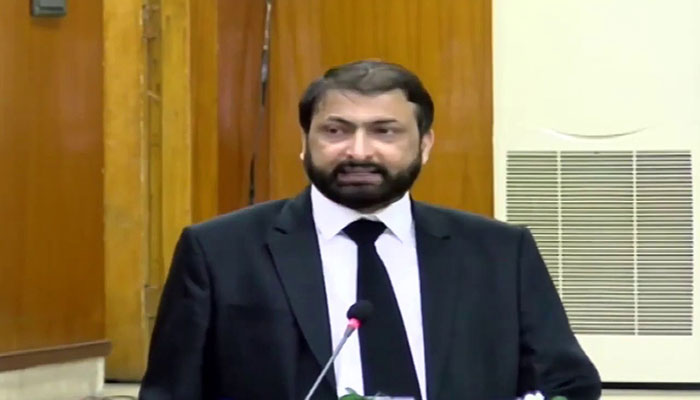Plea against offensive material on Google put off
MULTAN: Lahore High Court Chief Justice Muhammad Qasim Khan on Wednesday heard a petition seeking removal of offensive content from Google and adjourned the case until Jan 20.
The public prosecutors informed the apex court that a meeting was held in the office of the Attorney General on Tuesday to work out a mechanism in this regard. Petitioner Luqman Habib through his counsel Bilal Riaz Sheikh, Mohammad Faizan Maqsood, Waqas Abrar, Mian Mohammad Shakeel, Shehzad Baryal and Sajid Iqbal Lashari and others had filed a petition alleging that Mirza Masroor had joined hands with forces inimical to Islam and hatched a conspiracy against the Ummah by uploading objectionable and misleading material on Google regarding Islam.
He said that whenever Google was searched for information about Islamic caliphs, the name of Mirza Masroor came up. FIA and other relevant agencies were reluctant to take action against these elements, the counsel argued. Deputy Attorney-General Asad Ali Bajwa informed the court that a meeting was held in the office of the Attorney General of Pakistan in this regard.
PTA Chairman Amir Azeem said told the apex court that so far millions of websites with objectionable content had been shut. He said 19 websites belonging to the Qadianis had been shut. The court said they would build new websites and run them from the areas beyond Pakistan's jurisdiction. Home Secretary Yousuf Naseem Khokhar told the apex court that they were building a strong mechanism in this regard. FIA Cyber Crime Director Abdul Rab and other officials also appeared before the court.
-
 Gabourey Sidibe Gets Candid About Balancing Motherhood And Career
Gabourey Sidibe Gets Candid About Balancing Motherhood And Career -
 Katherine Schwarzenegger Shares Sweet Detail From Early Romance Days With Chris Pratt
Katherine Schwarzenegger Shares Sweet Detail From Early Romance Days With Chris Pratt -
 Jennifer Hudson Gets Candid About Kelly Clarkson Calling It Day From Her Show
Jennifer Hudson Gets Candid About Kelly Clarkson Calling It Day From Her Show -
 Princess Diana, Sarah Ferguson Intense Rivalry Laid Bare
Princess Diana, Sarah Ferguson Intense Rivalry Laid Bare -
 Shamed Andrew Was With Jeffrey Epstein Night Of Virginia Giuffre Assault
Shamed Andrew Was With Jeffrey Epstein Night Of Virginia Giuffre Assault -
 Shamed Andrew’s Finances Predicted As King ‘will Not Leave Him Alone’
Shamed Andrew’s Finances Predicted As King ‘will Not Leave Him Alone’ -
 Expert Reveals Sarah Ferguson’s Tendencies After Reckless Behavior Over Eugenie ‘comes Home To Roost’
Expert Reveals Sarah Ferguson’s Tendencies After Reckless Behavior Over Eugenie ‘comes Home To Roost’ -
 Bad Bunny Faces Major Rumour About Personal Life Ahead Of Super Bowl Performance
Bad Bunny Faces Major Rumour About Personal Life Ahead Of Super Bowl Performance -
 Sarah Ferguson’s Links To Jeffrey Epstein Get More Entangled As Expert Talks Of A Testimony Call
Sarah Ferguson’s Links To Jeffrey Epstein Get More Entangled As Expert Talks Of A Testimony Call -
 France Opens Probe Against Former Minister Lang After Epstein File Dump
France Opens Probe Against Former Minister Lang After Epstein File Dump -
 Last Part Of Lil Jon Statement On Son's Death Melts Hearts, Police Suggest Mental Health Issues
Last Part Of Lil Jon Statement On Son's Death Melts Hearts, Police Suggest Mental Health Issues -
 Leonardo DiCaprio's Girlfriend Vittoria Ceretti Given 'greatest Honor Of Her Life'
Leonardo DiCaprio's Girlfriend Vittoria Ceretti Given 'greatest Honor Of Her Life' -
 Beatrice, Eugenie’s Reaction Comes Out After Epstein Files Expose Their Personal Lives Even More
Beatrice, Eugenie’s Reaction Comes Out After Epstein Files Expose Their Personal Lives Even More -
 Will Smith Couldn't Make This Dog Part Of His Family: Here's Why
Will Smith Couldn't Make This Dog Part Of His Family: Here's Why -
 Kylie Jenner In Full Nesting Mode With Timothee Chalamet: ‘Pregnancy No Surprise Now’
Kylie Jenner In Full Nesting Mode With Timothee Chalamet: ‘Pregnancy No Surprise Now’ -
 Laura Dern Reflects On Being Rejected Due To Something She Can't Help
Laura Dern Reflects On Being Rejected Due To Something She Can't Help




